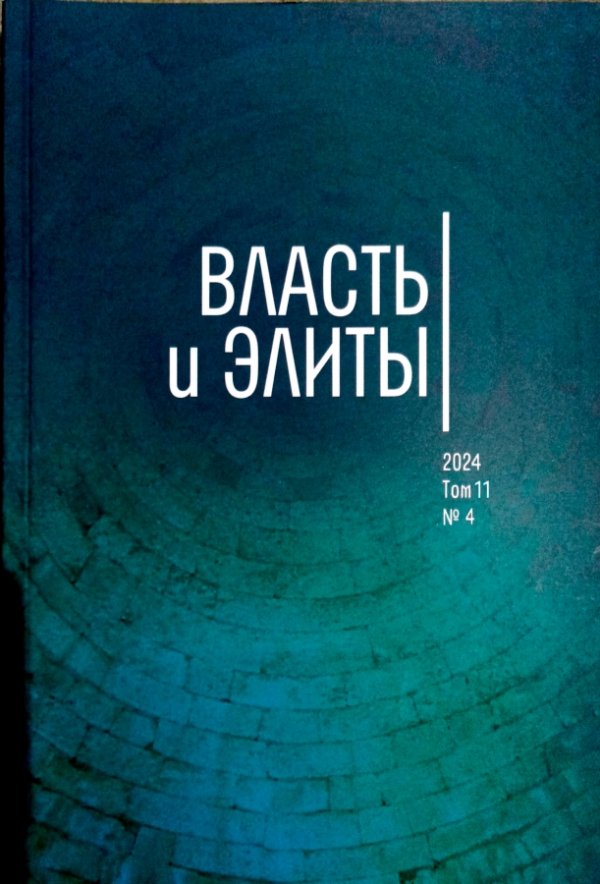On Some Current Problems of Elites Interpretation in Modern Political Theory
- Authors: Gutorov V.A.1,2
-
Affiliations:
- Federal Center of Theoretical and Applied Sociology of RAS
- St. Petersburg State University
- Issue: Vol 11, No 2 (2024)
- Pages: 7-34
- Section: PROBLEMS OF THE ELITE STUDIES
- URL: https://journal-vniispk.ru/2410-9517/article/view/291714
- DOI: https://doi.org/10.31119/pe.2024.11.2.1
- EDN: https://elibrary.ru/NXBRYA
- ID: 291714
Cite item
Full Text
Abstract
Keywords
About the authors
Vladimir A. Gutorov
Federal Center of Theoretical and Applied Sociology of RAS; St. Petersburg State University
Email: gut-50@mail.ru
ORCID iD: 0000-0001-8063-2558
SPIN-code: 7952-4892
ResearcherId: F-7724-2013
Doctor of Philosophy, Leading Research Fellow; Professor, Head of the Department of Theory and Philosophy of Politics, Faculty of Political Science, St. Petersburg State University Moscow, Russia; St. Petersburg, Russia
References
- Ball T. History and the Interpretation of Texts. Handbook of Political Theory. Ed. by G.F. Gaus, Ch. Kukathas. London; Thousand Oaks; New Delhi: Sage Publications, 2004. P. 18–30. https://doi.org/10.4135/9781848608139.n2
- Brennan G., Lomasky L. Toward a Democratic Morality. Democracy. Ed. by D. Estlund. Malden, Massachusetts; Oxford: Blackwell Publishers, 2002. P. 237–266.
- Burton M., Higley J. The Study of Political Elite Transformations. International Review of Sociology. 2001. Vol. 11. No. 2. P. 181–199. https://doi.org/10.1080/713674040
- Clarke S.G., Simpson E. Introduction. AntiTheory in Ethics and Moral Conservatism. Ed. by St.G. Clarke, E. Simpson. Albany: State University of New York Press, 1989. P. 1–28.
- Deets S. Jack Snyder, From Voting to Violence: Democratization and Nationalist Conflict. New York: W. W. Norton & Company, 2000. 320 pp. Nationalities Papers. 2001. Vol. 29. No. 2. P. 352–355. https://doi.org/10.1017/S0090599200019760
- Deneen P.J. Regime Change: Toward a Postliberal Future. New York: Sentinel, 2023. 288 p.
- Deneen P.J. Why Liberalism Failed. New Haven; London: Yale University Press, 2018. 225 p. https://doi.org/10.2307/j.ctvc5pcmt
- Estlund D.M. Democratic Authority: A Philosophical Framework. Princeton; Oxford: Princeton University Press, 2007. 309 p.
- Ferrara A. The Democratic Horizon: Hyperpluralism and the Renewal of Political Liberalism. New York: Cambridge University Press, 2014. 257 p.
- Ferrara A., Ivkovic M., Lončar J., Prodanovic S., Simeunovic B. Liberalism between Politics and Epistemology: A Discussion of Alessandro Ferrara’s The Democratic Horizon: Hyperpluralism and the Renewal of Political Liberalism. Political Studies Review. 2016. Vol. 15. No. 3. P. 1–23. https://doi.org/10.1177/1478929916645359
- Field G.L., Higley J. Elitism. London; New York: Routledge, 2013. 149 p. https://doi.org/10.4324/9780203070659
- Forbes H.D. Positive Political Theory. Handbook of Political Theory. Ed. by G.F. Gaus, Ch. Kukathas. London; Thousand Oaks; New Delhi: Sage Publications, 2004. P. 57–72. https://doi.org/10.4135/9781848608139.n5
- Gaus G.F. Contemporary Theories of Liberalism: Public Reason as a PostEnlighten ment. London; Thousand Oaks; New Delhi: Sage Publications, 2003. 240 p. https://doi.org/10.4135/9781446218754
- Higley J. Democratic Elitism and Western Political Thought. Comparative Sociology. 2009. Vol. 8. No. 3. P. 440–458. https://doi.org/10.1163/156913309X447611
- Higley J. Elite Trust and the Populist Threat to Stable Democracy. American Behavioral Scientist. 2020. Vol. 64. No. 9. P. 1211–1218. https://doi.org/10.1177/0002764220941215
- Higley J. The Endangered West: Myopic Elites and Fragile Social Orders in a Threatening World. London; New York: Routledge, 2016. 228 p.
- Higley J. Western Elites and Societies in TwentyFirst Century Politics: Avoiding Calamity. Cham, Switzerland: Palgrave Macmillan, 2023. 99 p. https://doi.org/10.1007/978–3–031–52307–6
- Higley J., Best H. Democratic Elitism Reappraised. Comparative Sociology. 2009. Vol. 8. No. 3. P. 323–344. https://doi.org/10.1163/156913309X447558
- Higley J., Burton M.G. The Elite Variable in Democratic Transitions and Breakdowns (1989). Historical Social Research. 2012. Vol. 37. No. 1. P. 245–268. https://doi.org/10.12759/hsr.37.2012.1.245–268
- Higley J., Pakulski J. Do Ruling Elites Degenerate? American and British Elites through Pareto’s Lens. Comparative Sociology. 2011. Vol. 10. No. 6. P. 949–967. https://doi.org/10.1163/156913311X607647
- Higley J., Pakulski J. Elite Transformation in Central and Eastern Europe. Australian Journal of Political Science. 1995. Vol. 30. No. 3. P. 415–435. https://doi.org/10.1080/00323269508402348
- Higley J., Pakulski J. Revolution and Elite Transformation in Eastern Europe. Australian Journal of Political Science. 1992. Vol. 27. No. 1. P. 104–110. https://doi.org/10.1080/00323269208402184
- Keeping the Tablets: Modern American Conservative Thought. Ed. by W.F. Buckley, Ch.R. Kesler. New York: Harper & Row Publishers, 1988. 469 p.
- Mansfield E.D., Snyder J. Electing to Fight: Why Emerging Democracies Go to War. Cambridge, Massachusetts; London: MIT Press, 2005. 300 p. https://doi.org/10.7551/mitpress/2660.001.0001
- Political Elites in the Transatlantic Crisis. Ed. by H. Best, J. Higley. New York: Palgrave Macmillan, 2014. 188 p. https://doi.org/10.1057/9781137345752
- Snyder J. From Voting to Violence: Democratization and Nationalist Conflict. New York: W. W. Norton & Company, 2000. 320 p.
- Snyder J. Human Rights for Pragmatists: Social Power in Modern Times. Princeton; Oxford: Princeton University Press, 2022. 310 p. https://doi.org/10.2307/j.ctv25c4zgx
- Suleiman E.N. Elites in French Society: The Politics of Survival. Princeton, New Jersey: Princeton University Press, 1978. 299 p.
- Talisse R.B. Democracy. The Routledge Companion to Social and Political Philosophy. Ed. by G.F. Gaus, F. D’Agostino. New York; London: Routledge, 2012. P. 608–617.
- The Palgrave Handbook of Political Elites. Ed. by H. Best, J. Higley. London: Palgrave Macmillan, 2018. 698 p. https://doi.org/10.1057/978–1–137–51904–7
- Volpe G. Italian Elitism and the Reshaping of Democracy in the United States. London; New York: Routledge, 2021. 194 p.
- Whelan F.G. Hume and Machiavelli: Political Realism and Liberal Thought. Lanham; Boulder; New York; Toronto; Oxford: Lexington Books, 2004. 416 p.
Supplementary files











